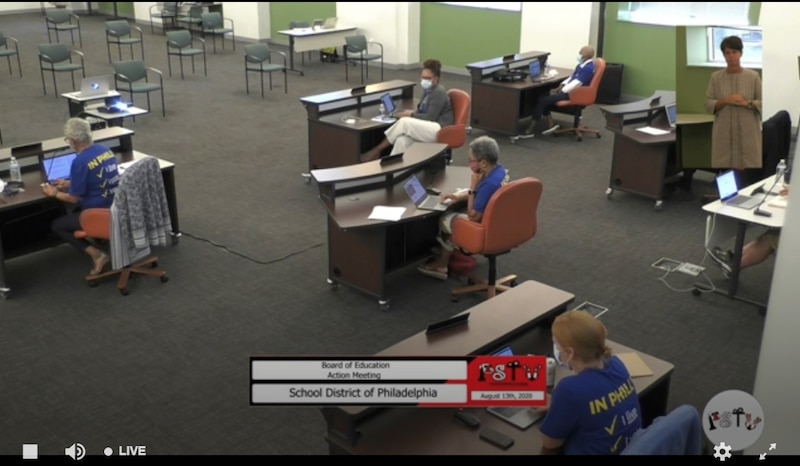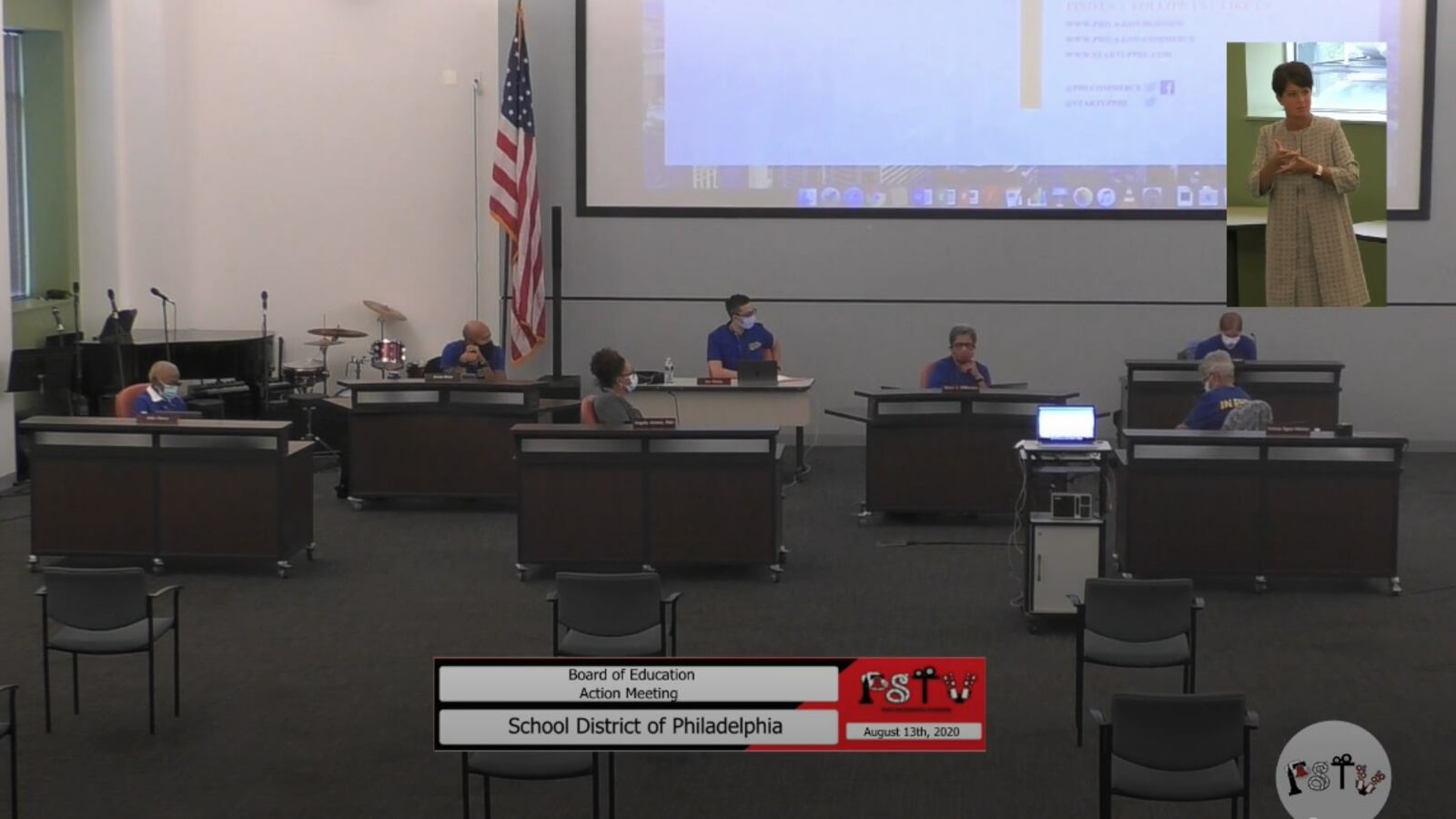This article was originally published in The Notebook. In August 2020, The Notebook became Chalkbeat Philadelphia.
In what proved to be a long, disjointed evening marred by technical difficulties, the Philadelphia Board of Education held an “in-person” joint committee meeting on Thursday, its first non-virtual session since the arrival of the COVID pandemic in March.
The four-hour-plus meeting covered a range of topics but resulted in no specific recommendations from the two board committees represented: Finance & Facilities and Student Achievement & Support.
The evening’s most concrete lesson: Faithful fidelity to COVID safety protocols requires constant vigilance by leadership. That was brought home by board member Angela McIver, who on at least four occasions had to remind District staffers to sanitize the speaker’s lectern and its PowerPoint “clicker” before speaking into the microphone.
“You all should just be happy that you’re not my children,” McIver joked.
Otherwise, it was an evening of considering and discussing a variety of short- and long-term School District projects, periodically interrupted by problems with phone connections, poor audio, confusion over procedure, and breakdowns in video streaming. The agenda included an update on reopening plans, a debate on a resolution supporting Black Lives Matter, and a lengthy presentation about a proposed tax abatement for a South Philadelphia redevelopment project.
Where needed, votes on those items will take place at next week’s board action meeting on Aug. 20.
Board members also heard a sobering financial update from Chief Financial Officer Uri Monson, whose latest figures show that the District remains on solid footing, but faces a future in which costs and revenues alike are increasingly difficult to predict.
Much will depend on additional federal stimulus, Monson said, but prospects for the proposed HEROES Act have dimmed as talks have stalled in Washington.
“The single biggest thing is going to be the federal response, HEROES or whatever they want to call it,” Monson said. “I’m less optimistic than I was a couple weeks ago … We’ll keep working and talking to folks about why we need those funds.”
Money matters: A positive balance for now

Board meeting photo by Lauren Wiley
While member Maria McColgan joined the session by phone, the seven other board members were present, seated at individual desks set six feet apart at the front of the District’s central office auditorium. Most wore royal blue T-shirts promoting the U.S. Census, the backs of which read: “I live, I vote, I count.” District officials sat, spaced apart, in what is normally the audience seating, and they came forward to speak as needed.
In his presentation, Monson told the board that the District’s current fiscal year looks on track to end with a fund balance of $179 million, slightly larger than anticipated due to cost savings associated with closing school buildings in March.
But the year to come will be a challenge, he said, due to questions about costs and tax revenue.
“For the economy to stabilize would probably be the single most important thing,” Monson said.
On the cost side, he said, “there are so many changing guidelines,” and that makes assessing costs difficult. Monson said his team is working with multiple projections for the costs associated with various scenarios, as recommendations evolve for pandemic-related items such as personal protective equipment, ventilation, and instructional supports.
Likewise, with revenue, District officials won’t start to get useful data until the fall, but Monson anticipates some declines. Locally, for example, real estate tax revenue will probably remain stable, but liquor-by-the-drink revenue looks “shaky,” he said.
For immediate needs, Monson said, state officials still have two big pots of cash they can dip into: the governor’s $60 million emergency fund and the far larger remnants of Pennsylvania’s share of federal stimulus from the CARES Act – about $1 billion. Some of that money could go to school districts, but for now, all of it remains in Harrisburg, unspent.
“We’re essentially waiting for the governor and the legislature to act,” said Monson. “The need is now.”
However, when asked by member Lee Huang, Monson told board members that so far the District hasn’t had to compromise for lack of finances.
“We have not said ‘no’ to anything,” Monson said. “There are enough reserves set aside [and] this buys us time. … There’s a point where we’re not able to do all the things we want to do now. We’re not there yet.”
Reopening: Principals’ plans due soon
With the start of virtual classes just weeks away, Chief of Staff Naomi Wyatt told the board that principals have just one week to submit their schools’ digital learning plans for review.
Few principals have yet done so. “All [plans] will be submitted and approved by Aug. 21,” Wyatt said. “To date, two have been submitted and approved.”
The principals’ plans are meant to show that they’re ready to manage their school’s students and staff safely and effectively as the virtual school year begins. Students will learn online until at least November. Principals have been asked to spell out plans for class schedules, staffing, student support, teacher observation and training, and more.
Principals have said that they have numerous unanswered questions about such matters, including allowable schedules for teachers and online privacy protocols for students. None testified at Thursday’s session, but Robin Cooper, head of the Commonwealth Association of School Administrators, has said that the board can expect to hear from her members at its action meeting next week.
Wyatt also spoke extensively about cleaning, saying that 42% of District buildings have been completely cleaned, with the rest soon to be completed. She also said that ventilation assessments of all rooms in all buildings will be completed by Oct. 9, part of a larger “readiness” push. District officials are in the process of gathering 250,000 masks and 19,000 hand-sanitizer units, Wyatt said, and systems will soon be in place to track the need for such equipment at each site.
Four charters to try ‘hybrid’ learning
District officials told the board that all 86 Philadelphia charter schools had submitted their required “health and safety plans” to state officials. Christina Grant, head of the District’s Charter Schools Office, told the board that although most charters will start the year virtually, four have proposed “hybrid” plans with some in-person instruction. She did not name the four.
Grant’s office plays no formal role in evaluating, authorizing, or monitoring the implementation of the charters’ safety plans, and she has advised that parents who have questions about particular schools contact those charters’ boards.
However, the Charter Schools Office is involved in some discussions about interconnected services such as transportation, because the District pays for transit for charter students. “The four schools that are exploring hybrid options, to the extent that they need busing, we’re going to provide that,” said Grant.
Black Lives Matter resolution uncertain
The board discussed a proposed resolution supporting District participation in a “Black Lives Matter Week of Action.” The resolution would encourage District officials to “participate in the national Black Lives Matter At School Week … during the first week of February each year.”
Some Black board members found the resolution wanting. Board President Joyce Wilkerson said she had “no interest” in supporting rhetorical statements when more substantive action is merited.
“It isn’t enough to say, ‘Black lives matter.’ We need to do more,” Wilkerson said.
Board member Julia Danzy said she would like to see racism addressed comprehensively, and all year round. “We don’t just exist in February. We exist 12 months of the year,” she said.
Other members urged action on the resolution, including Lee Huang and Mallory Fix Lopez, who said that a vote in favor of the resolution next week would be a good way to show board support for students and staff as the school year begins.
Consultants for antiracism training
The board debated a proposed $700,000 contract for the Massachusetts consulting firm KJR Consulting, focusing in particular on a $150,000 portion earmarked for “antiracism” training for Superintendent William Hite’s 110-person executive team.
Some members questioned the need to hire a Boston-area firm with little experience in social justice when many in Philadelphia have done extensive work in that area. “We talk about building internal capacity,” said Fix Lopez. “How does that help internal capacity?”
Added member Leticia Egea-Hinton: “Is there no one in Philadelphia who does this work, that understands Philly? … I sort of feel that we really needed someone that was closer to our roots.”
Wyatt said that KJR was a familiar enterprise that has good relationships with District executives and can build on past “mindset” work it has done with central office staff, in which it helped promote the idea that “all students can learn.”
KJR has worked with the District since 2018, Wyatt said, and is well-positioned to engage in hard conversations.
“They do understand the leadership team,” she said. “Because we’ve worked with them, they’re going to be able to lead us in a familiar way.”
Wyatt said the District would bring in other partners, too.
“We’re also working with Philadelphia groups,” she said. “We’re not working exclusively with folks that aren’t from Philly.”
Member Ameen Akbar said he was concerned that the District’s various anti-racism efforts weren’t as well coordinated as they could be. Principals, teachers, and administrators are all involved in various initiatives, he said, but the overall effort “feels like it’s missing some pieces. … It just feels piecemeal,” Akbar said.
Request on Keystone Opportunity Zone
The Philadelphia Department of Commerce is requesting the District’s support for a series of tax abatements at the site of a former South Philadelphia refinery. Duane Bumb, the city’s deputy director of commerce, gave a detailed presentation about development plans for the 1,300-acre site near the Philadelphia International Airport, which officials hope to make a Keystone Opportunity Zone.
That would spare the developers a number of costs, such as some sales and occupancy taxes, but require them to make “Payments in Lieu of Taxes”, or PILOTS, amounting to 110% of the assessed real estate value. The PILOT agreement for the South Philadelphia site would guarantee the District about $746,000 annually, Bumb said.
Board member Akbar said the massive development project provided a “real opportunity” for internships and other student benefits. Filling out the various parcels is expected to take a decade or more.
And although Bumb was optimistic about such prospects, he could offer no guarantees. Board President Wilkerson said she worried that once the board gives its blessing to the project, the annual PILOT payment will be the extent of the benefit.
“My concern is, we’ll sign off and then we’ll never see [the developers] again,” Wilkerson said. “People will ask us, ‘Where are the jobs?’ and we’ll say, ‘uhhhh.’”


